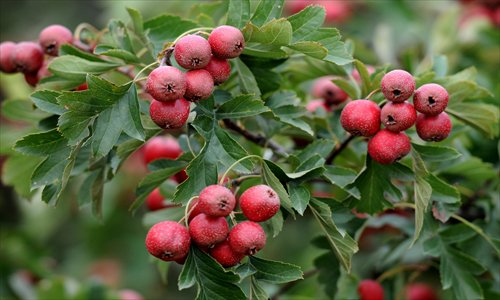Stick your neck out

Editor's notes
The ancient Chinese created an agricultural solar system - still in use today - that is based upon their observation of crops, climate, astrology, and the study of animal and plant life cycles. The system guided farmers as to when to sow seeds and when to harvest them, and this system has now been in place for more than 2,000 years.
Today, with advances in science and technology, agriculture depends less on this ancient wisdom. But this seasonal calendar still operates as a reference guide for gourmands to seek out the best times for seasonal delicacies and for health experts to plan nutritious diets.
In a single year, the system features 24 "solar terms," each lasting one day and occurring every two weeks. Each has its own name and characteristics. The Global Times is presenting a weekly series examining which foods and delicacies are best enjoyed during these periods, as well as tips on preserving general health.
As the 21st solar term in the traditional Chinese agricultural system, daxue (meaning "heavy snow"), falls on December 7 this year and heralds more freezing weather. The cold can easily cause problems with blood circulation and which can then lead to serious conditions like strokes, heart attacks and cerebral apoplexy.
"Keeping yourself warm is vital, especially the head, neck, back and feet," said He Yan, chief physician from the heart disease department at the Longhua Hospital Shanghai University of TCM (Traditional Chinese Medicine). And from the perspective of a TCM doctor, He shared some tips about how to stay healthy during daxue.
Throat inflammation
According to He, the neck is one of the most vulnerable parts of the body in cold weather because cold air can easily inflame the throat and trachea.
So she suggests that it is advisable to wear high collars at this time of year, or to keep the neck wrapped up in a scarf. This is an especially good idea for people who suffer any problems with their back or vertebrae. And long scarves also have the advantage of being able to keep the chest warm. "Getting into the habit of wearing a hat to keep the head warm is also important," she said.
She added that exercising the neck is also a good way to stay healthy. Turning the head in all directions for a few minutes every day helps to keep the blood flowing in the neck and cranium.
And gently patting the head and neck is also said to help prevent headaches and colds. "A tender hand massage kneading the neck area is very helpful, but don't do it too forcefully," said He.
While people maintain a healthy appetite in winter, they are less likely to keep up a regular exercise routine and this can slow down the metabolism and cause weight problems. Hawthorn, which contains large quantities of dietary fibers, is ideal as a stomach cleanser and at facilitating digestion.
Rich in nutrients
"Hawthorn is rich in a variety of nutrients which can improve the body's immune system and relax the blood vessels. And of these nutrients, pectin is particularly helpful in reducing cholesterol and regulating blood sugar levels," said He. "But be minded that people who suffer from excess gastric acid should limit their intake of hawthorn."
There are many ways to eat hawthorn, such as preserved hawthorn, hawthorn-candied gourd and hawthorn pastries. And possibly the easiest way is to brew tea with dried hawthorn and which can be purchased from supermarkets.
Drinking enough water on a daily basis is vital to maintaining a balanced metabolism. At least 2 to 3,000 milliliters a day is suggested, but avoid drinking very cold or iced water.
Rice wine, or huangjiu, is also a favorite with many people in winter, especially drinking a small amount at night.
"Rice wine aids the flow of blood and warms the body, and red wine has the same benefits," He said. "But wine obviously isn't suitable for everyone; certainly not for people with liver problems."